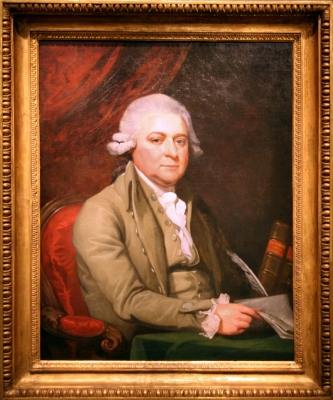

Let Fame to the world sound America's voice;
No intrigues can her sons from their government sever;
Her pride is her Adams; Her laws are his choice,
And shall flourish, till Liberty slumbers for ever.
- "Adams and Liberty", lyrics by Robert Treat Paine, Jr., 1798, to the tune of "To Anacreon in Heaven"
In an 1821 letter to John Adams, Richard Stockton, Jr. wrote of his late father and signer of the Declaration of Independence, Richard Stockton: "I well remember that on his first return from Congress in the Summer of 1776 after the 4th. of July he was immediately surrounded by his anxious political Friends—who were eager for minute information in respect of the great event which had just taken place—Being then a Boy of some observation and retentive memory I remember these words addressed to his Friends—'The man to whom the Country is most indebted for the great measure of Independence is Mr John Adams of Boston'—'I call him the Atlas of American Independence'—'He it was who sustained the Debate, and by the force of his reasoning demonstrated not only the justice but the expediency of the measure.' This I have often spoken of to others and distinctly remember the very language which he used."
Though Thomas Jefferson was undoubtedly the principal author of the Declaration of Independence, John Adams played a major role in the push toward independence and in the Committee of Five. Over time, Adams' name became almost completely disassociated with the Declaration, while Jefferson's name became nearly synonymous, as we explored in our May Highlight. This month, read about the defense and recognition of Adams' role in the creation and legacy of the Declaration of Independence in early 19th century newspapers.
To set an Adamsite mood, listen to "Adams and Liberty" an ode to Adams written by Robert Treat Paine, Jr. in 1798 and used as a campaign song in 1800.
Before diving into the Election of 1800, it is worthwhile to rewind to the Election of 1796, when John Adams beat out Thomas Jefferson to become the 2nd President of the United States. On December 28, 1796, with the results of the election all but announced, Jefferson wrote to congratulate Adams, and remarks on the growing animosity between them: "that your administration may be filled with glory, & happiness to yourself and advantage to us is the sincere wish of one who though, in the course of our voyage through life, various little incidents have happened or been contrived to separate us, retains still for you the solid esteem of the moments when we were working for our independence..." Whether Jefferson meant the collective "we" of the Founding Fathers or the more specific "we" of the drafters of the Declaration is debatable, but regardless, in 1796 Jefferson esteemed Adams as a leader because of his role in declaring independence. For those interested, the rest of the letter is a goldmine of quotes on Jefferson's reluctance to govern, and grand desire to remain "retired". Bear in mind, Jefferson was sworn in as Vice President of the United States three months later.
As we explored last month, during the election of 1800 the Declaration of Independence was used as a positive propaganda tool for Jefferson. It was also occasionally used against John Adams, by those who believed he had abandoned the ideals and the independence for which he had once fought. But during the election and in the first few years of Jefferson's presidency, certain newspapers decided to tamp down Jefferson's role in the Declaration of Independence and highlight Adams', eventually leading to a broader discussion of how the Committee of Five was chosen and how it operated.
Columbian Centinel and Massachusetts Federalist, May 28, 1800 (Boston, MA)
"But the sum total of Mr. Jefferson's merit, his paramount and indefesible [sic] claim to the President's chair, is his concern in the declaration of independence. What concern? Did he first move it in Congress? No—Mr. Adams was the first who made the motion.—What then, did he support the motion in his place? Oh! not at all, Mr. Jefferson is no orator and never spake in public but once or twice.—He signed it then? To be sure and so did all the members present—But he drew it up with his pen?—He was the chairman of a committee of five who reported the first draft, and it is probable that his pen was employed to compile his own ideas, and those of his colleagues on the committee, and though we know not what alterations were made in the instrument in Congress where it was debated three days, yet on the whole it is fair to presume that the credit attached to it as a composition, principally belongs to Mr. Jefferson. So the fact stands. John Adams and others made the independence of America. Thomas Jefferson put their doings upon paper."
Federal Gazette & Baltimore Daily Advertiser, July 12, 1800 (New York, NY)
"BOSTON, July 2. From the frequent mention that Jefferson was the author of the Declaration of Independence—ignorant people might be led to doubt whether others, who were esteemed patriots, approved of the measure. If Jefferson penned the declaration, it probably was an accidental hour in the arrangement of committees, and every other member of congress would have been proud of the task.—The following letter from the person who is now the president of the United States was written the day after that declaration was made. The fervour of sentiment and language, would authorize a strong presumption of the constant fidelity of the writer to his principles. [Excerpt of letter from John Adams to Abigail Adams, actually dated the day before the Declaration, July 3, 1776]"
Albany Gazette, September 5, 1803 (Albany, NY)
"Salem, (Mass.) August 19. Declaration of Independence.----The writing of this instrument has been with great earnestness attributed to Mr. Jefferson, and a vast deal of merit attached to him for it, as though that writing was the cause of what it was indeed only the effect. If to any ONE MAN is to be attributed a power of conception, an energy of mind, an adherence to principle, which wrought up the public spirit of America, and ripened it for that act, it was undoubtedly our late President John Adams."
Minerva; or Anti-Jacobian, August 20, 1804 (Raleigh, NC)
"Of that Mr. Adams who acted as a conspicuous part in the atchievement of our independence, who instructed us in the formation of our excellent constitution, who for four years administered our government upon its true principles, and whose name will fill a distinguished place in history, while this man, this same Jefferson, who attempts to filch from others the credit of penning the declaration of Independence, and who wrote from France advising that the constitution should not be adopted, will be remembered only as an ambitious and unprincipled demagogue, who hired base calumniators to traduce and villify Mr. Adams, and upon whose murdered reputation he was enabled to raise himself to the Presidency."
The issue of Jefferson and Adams' respective roles in the creation of the Declaration of Independence was tackled in other newspapers, pamphlets, and letters, but nowhere more poignantly than in their obituaries. Remember that both Thomas Jefferson and John Adams died on July 4, 1826, the fiftieth anniversary of the Declaration of Independence. Here are two final newspaper articles — one an obituary for Adams, the other a tribute to both men — highlighting the "Atlas of Independence" and his colleague-turned-adversary-turned-friend.
Essex Register, July 6, 1826 (Salem, MA)
"On Tuesday last closed the half century since the patriots and sages of this country proclaimed its independence, and with its parting rays the spirit of the elder ADAMS ascended to heaven. That bold and energetic spirit which inspired the councils of America with the determination to become independent has ascended on high, and that eloquent tongue which ruled its declaration on the fourth of July, 1776, on the fourth of July, 1826, was palsied in death."
Daily National Intelligencer, July 11, 1826 (Washington, D.C.)
"So astonishing a coincidence as the contemporaneous death, by natural causes, of these two great men of the North and South—the only survivors of the committee which reported the Declaration of Independence—the two first Vice Presidents and the second and third Presidents of the United States—breathing their last on the Jubilee of the Independence they were greatly instrumental in declaring—has excited an universal sensation. No language can exaggerate it—no reason account for it. It is one of those events which has no example on record, and, as a beauteous moral, must forever stand alone of the page of history."
Special thanks to Cari Kramer. All newspaper excerpts taken from the America's Historical Newspapers collection on Readex, accessed through Harvard University.
By Emily Sneff

